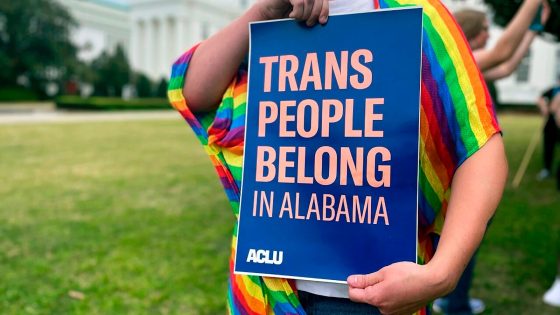A bill aimed at furthering restrictions on discussions of “gender identity or sexual orientation” in public schools is progressing in the Alabama legislature, passing the state House on Tuesday.
Current law states that classrooms in kindergarten through the fifth grade “shall not engage in classroom discussion or provide classroom instruction regarding sexual orientation or gender identity in a manner that is not age appropriate or developmentally appropriate for students in accordance with state standards.”
The bill would expand this restriction to eighth grade and prohibit flags symbolizing sexual orientations or gender identities in K-12 schools.
In this undated stock photo, a student raises her hand in class.
STOCK PHOTO/Getty Images
Gender identity, as defined by the Centers for Disease Control and Prevention, is “an individual’s sense of their self as man, woman, transgender, or something else.”
Sexual orientation refers to “a person’s sexual and emotional attraction to another person and the behavior and/or social affiliation that may result from this attraction,” according to the CDC.
State Rep. Mack Butler, the bill’s sponsor, said in a March hearing the bill is a response to “some indoctrination going on.” He said the bill seeks to “purify the schools.”

A person holds up a sign reading, “Trans People Belong in Alabama,” during a rally outside the Alabama Statehouse in Montgomery, Ala., on International Transgender Day of Visibility, March 31, 2023.
Kim Chandler/AP, FILE
“It is a component of Marxism where we’re — you know — destroying the family and teaching some of these things,” said Butler. “Let it happen somewhere else other than our schools.”
Critics argue that these restrictions, dubbed “Don’t Say Gay,” could broadly restrict conversation about gender and sexuality –including both non-LGBTQ and LGBTQ identities.
They also argue that the bill violates students’ and teachers’ First Amendment rights, and could silence LGBTQ students and teachers in classrooms.
“If HB130 passes, it will rid classrooms and students in the state of Alabama of inclusive discussion that is essential at all stages of life,” the ACLU of Alabama said in a statement against the legislation.
A similar law in Florida sparked controversy for its restrictions and inspired almost identical policies across the country. However, a settlement was reached in a lawsuit against the legislation.
A judge decided that students and educators can discuss LGBTQ topics or write about such topics in their work, as long as those conversations are not part of formal curriculum, with both sides of the debate claiming the decision as a win.
Source Agencies



